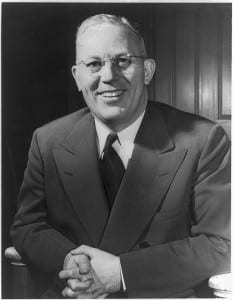The success of Holmes v. Atlanta in the Supreme Court was, in part, attributable to the NAACP and Thurgood Marshall’s legal expertise. In addition, the case was argued during the Warren Court. Under Chief Justice Earl Warren, the court actively used judicial review to promote civil rights for all. The activist stance of Justice Warren contrasts with the tenor of US District Court Judge William Boyd Sloan who upheld “separate but equal” doctrine.
Thurgood Marshall
In 1965, Thurgood Marshall became the first African American Solicitor General, and in 1967, the first African American Supreme Court justice. He was instrumental in successfully arguing Brown v. Board of Education, the landmark Supreme Court decision that led to public school desegregation, and later helped represent the plaintiffs in Holmes v. Atlanta.
 William Boyd Sloan
William Boyd Sloan
William Boyd Sloan was a Georgia State Representative from 1927 to 1931. He served as Assistant Attorney General of Georgia for one year before being elected in 1934 as a judge in Hall County, Georgia. He was nominated by President Harry S. Truman in 1951 for US District Court for the Northern Court of Georgia. He served on that court until his death in 1970. Sloan upheld the “separate but equal” doctrine in Holmes v. Atlanta.
